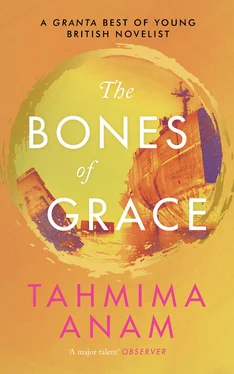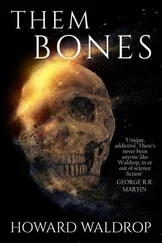I went to the place of dreams, Elijah, the place of otherness. I want to say I remained in the rational and saw nothing, but I have been unable to wash out the conviction that I dreamed of you the whole time I was unconscious. In the place of otherness, it was your face I saw, you sitting beside my hospital bed, holding my hand so that the pulse at your wrist galloped steadily beside mine, your breath against my skin as you kissed my bruised forehead. It was only a few hours, but, to my mind on the other side, it seemed far, far longer, years, time measured as it was in the age of Ambulocetus .
The age of Ambulocetus was forty-nine million years ago, after the Indian subcontinent crashed into Asia, creating the Himalayas and sealing off the mighty Tethys. Even then, Ambulocetus still clung to her hind legs, allowing her a few hours on shore every day to lie by the sea and catch the sun that beat down on the northern Asian plateau. But it was in the sea that she was at home, unlike her ancestor, Pakicetus , who remained in the shallows, her grazing water only knee-deep. And down through the generations, Ambulocetus ’s descendants became bolder, travelling to deeper and wider waters, their snouts elongating, their hind feet becoming webbed, their front teeth narrowing to catch prey underwater.
The story of Ambulocetus is the story becoming, of transformation, of leaping between one sort of being and another sort of being, of leaving history behind for the wide swathe of the possible. It is not the story of extinction. Ambulocetus is no Mastodon, vanished from the earth with the snap of evolution’s hand; no, her story is of the rather slower sort, as, generation by generation, she leaves behind the hoofed foot and short snout of the Mesonychid, over time developing the curved bones in her ears that will allow those who tug at her grave to read her like a hieroglyph: here lies a whale, a creature who lives and eats and breathes by the ocean’s heartbeat.
I had been injured by a piece of the crate as it broke apart. It was a knock on the head, stitches, a slight concussion, and a fractured elbow. There would be many tests, back in Dhaka, to make sure there had been no permanent damage, but they would all reveal the same thing: that I’d had a lucky escape, given that I had foolishly rushed towards the piano as everyone else had scattered.
It was not you at my bedside. It was not your voice in my head, crying, ‘My girl, my girl.’ That was my father. It was not your hand in my hand. That was my mother. And it was not your breath on my face, kissing my bruised forehead. That was Rashid.
Mo. When I peeled open my eyes, I called out his name, and they said, when you are better, you can see him. I closed my eyes again, willing them to be gone, willing them to be the dream and you the real after the dream. But when I looked again, there they all were, so selfish in their worry for me. I was hardly injured. At least, not in the common way.
I was in a government hospital. The room, the best they had, was bare except for my bed and the three chairs that seated my family. It smelled of urine and antiseptic. There was no window, only a flickering tube light fixed to the wall.
I woke up again in the darkness and I screamed and screamed until the doctor arrived with a needle and so I pulled out the IV, and then my father said, ‘Let’s take her; she has to find out anyway.’
I remember the rest vividly. On the other side of the hospital, in a room with two beds, lay Mo. On the second bed was a girl with a shaved head. They were both sleeping, and unlike me in pyjamas my mother had brought from home, they were in hospital gowns that were too large, their arms protruding like cherry stems. There was a monitor that beeped intermittently. Mo’s chest rose and fell.
Their faces, untouched, were perfect.
‘There are internal injuries,’ the doctor explained.
‘Can you operate?’
‘Profound injuries,’ he said.
I pulled back the sheet. Mo’s legs were bandaged all the way up to his thighs, and around his midriff there was a large bloodstain. ‘The dressing needs to be changed,’ I said.
‘Profound injuries,’ the doctor repeated. Abboo put his arm delicately around my shoulder and I flinched, feeling a wound where there wasn’t one. Mo had been smuggling himself out of the country in the crate. (To you, Elijah.) He heard the piano was being shipped to America, and he wanted to go. And with him, in the crate, was a girl. They were trying to locate her family, but no one had heard of her. She wasn’t from the beach and she wasn’t from the town. Maybe it was his friend, the girl he said he wanted to marry. When he grew up. Which would now be never.
*
On the second day, a man came to the door and said his name was Anwar. ‘You are not Megna,’ Anwar said.
I was unmoved. Nothing could surprise me now. A boy had packed himself into a crate to be with you. I had loved you and been loved in return, and yet I was not with you, I was here, in this blue and white room.
‘Who are you?’ That was Rashid. I gestured for him to let the man speak, my arm weighed down by a thick padding of bandages.
Anwar approached me, getting closer than a man like him could hope to get to a woman like me, until I could see the ridges on his forehead, the plateaued calluses on his palm as he waved his hand over me, disbelieving.
‘She was my sister,’ I managed. Then I was crying. ‘She was my sister.’ And he was crying too, his features collapsing together in the middle of his face, covered finally by that callused hand. Someone pulled him away and ushered him out of the room, and I drifted again to the place of dreams, of otherness, of you.
All the time I was lying in that hospital bed, Ammoo whispered into my ear. Telling me how sorry she was to have kept the truth from me, that I was going to come home now and it would all be put right. The silence would be shattered. The unsayable would be voiced. We would find my mother. We would retrace her steps. We would search up and down the country.
On the third day, they let Anwar return. We talked and talked, or rather, he talked, and I listened. Hours passed. I shared a piece of banana bread with him, a gift from Komola. That’s when he told me my mother was dead. Before I could grieve for her, which I did with the barest sense of what I was mourning, they told me that Mo had died in the night. They had switched off the machines. Did I want to see him? I shook my head. I had said my farewell the day before, when I had taken the soles of his feet and pressed them against my cheek and begged him to forgive me because I knew he had only loved you because I had led the way, because I had suggested to him that his wishes could grow that big, out of the beach, beyond the country, to a place of pianos and cold winters and childhood.
The doctor said I should be transferred to a private hospital in Dhaka. I needed an orthopaedic surgeon to set my arm properly. Anyway, I was taking a bed. Someone might need it. I refused to be discharged. They replaced the IV and gave me sedatives and I slept and slept.
On the sixth day, Anwar brought the girl to my bedside, and he told me this girl, whose name was Shona, was Megna’s daughter and his daughter. And he told me the story of the woman he had once loved and left behind.
She hid behind his legs so I had no idea if she resembled me. ‘Come here,’ I said, my voice like a broken glass bottle. She remained behind her father but she extended her hand to me and I grasped the tips of her fingers. Again I cried. Again my mother whispered into my ear. My mother was dead. My mother loved me. My mother was a shit-poor woman from nowhere. I had a twin sister. My sister had a daughter. My sister’s daughter was also my daughter. On the seventh day, these were the words that came to my lips.
Читать дальше












